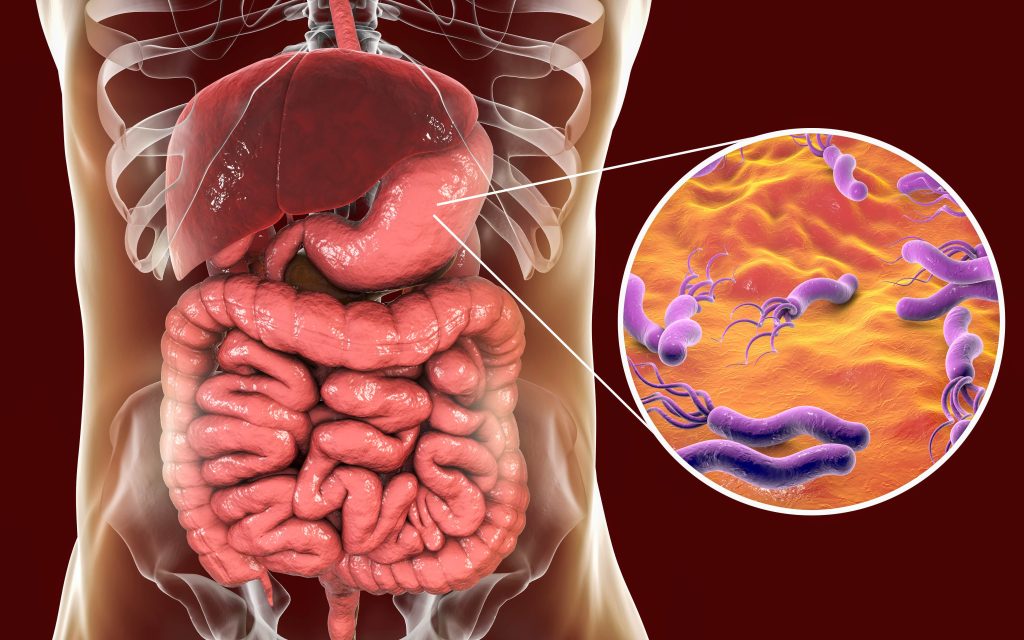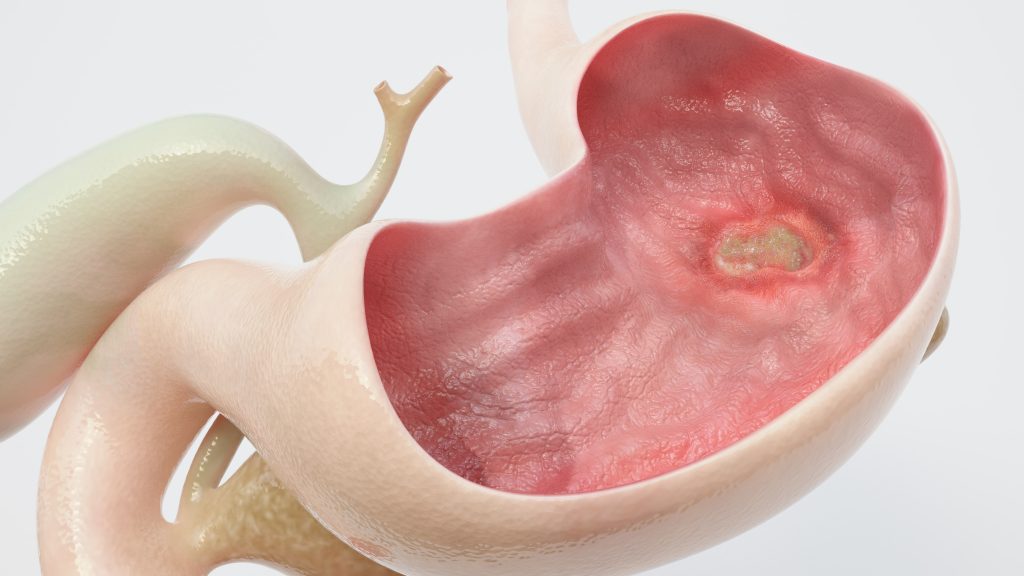What is a Helicobacter Pylori Infection?
Helicobacter pylori (H. pylori) infection is a bacterial infection that causes ulcers of the stomach and duodenum , certain types of stomach cancer and inflammation of the stomach (gastritis) and duodenum (duodenitis). Infection is very common and is the most common cause of gastritis, duodenitis and peptic ulcer disease.
According to a 2019 study, H.pylori is a common condition present in over half the world’s population, with a 31% seroprevalence rate in Singapore.
What are the symptoms of Helicobacter Pylori infection?
Some people with H. pylori develop symptoms such as:
- Pain or discomfort in the upper abdomen
- Indigestion
- Loss of appetite
- Nausea
- Bloating
- Frequent burping
When should I go to the doctor?
You’re advised to consult a doctor should you experience any of the symptoms above. However, pay attention to other accompanying symptoms that may indicate a more serious condition such as:
- Abdominal pain that wakes you up at night
- Blood in your stools
- Black tarry stools
- Bloody or black vomit
What causes a H. Pylori infection?

H. pylori infects the lining of the stomach, H. pylori can also be found in stool, saliva, and plaque on the teeth. H. pylori is transmitted from person to person through direct contact with saliva, vomit or faecal matter, or spread through contaminated food or water.
H. pylori infection is often acquired in childhood. Risk factors include crowded living conditions, unreliable supply of clean water, or living with someone with a H. pylori infection.
Can you prevent a H. Pylori infection?
To lower your risk of an infection, drink clean water and use clean water during food preparation. Wash your hands thoroughly with soap and water before eating and after using the bathroom.
How is H. Pylori Infection diagnosed?

Biopsy
A tissue sample (biopsy) is taken from the stomach lining. To obtain the sample, an endoscopy is conducted, where a tube is inserted down the throat into the stomach.
Stool samples
A stool test detects traces of H. pylori in the faeces.
Urea breath test
You will exhale into a bag before and after drinking a specialised solution which contains a substance that is broken down by H.pylori. The breakdown products are measured in your breath.
If you have no symptoms and no past history of peptic ulcer disease, H. pylori testing is usually not recommended. However, it may be considered for people with higher risk.
This includes those with a family history of stomach cancer, particularly individuals of Chinese, Korean, Japanese, or Central American descent; these groups have a higher incidence of stomach cancer.
What does it mean if you test positive for H. Pylori?
A positive result generally indicates that your signs and symptoms are caused by the sequelae of having the infection. Your doctor will then prescribe treatment such as antibiotics and other medications to kill the bacteria and alleviate symptoms.
Dr Benjamin Yip’s take on H.pylori: Helicobacter pylori is classified by the International Agency for Research on Cancer (IARC) as a definite carcinogen. Hence, it is important that you complete your course of treatment if you are infected by the bacteria. Do not be disheartened if the first line treatment prescribed by your doctor fails to eradicate the bacteria. There are several other treatment regimes that your doctor can use with generally good cure rates.
How is H. Pylori Infection treated?
H. pylori infection are treated with a combination of antibiotics and an acid-reducing proton pump inhibitor.
Antibiotics
Usually two antibiotics are prescribed, such as amoxicillin, clarithromycin, metronidazole and tetracycline.
Proton pump inhibitors (PPIs)
Proton pump inhibitors (PPIs) that help reduce the amount of acid produced by the stomach, such as ansoprazole, omeprazole, pantoprazole, rabeprazole or esomeprazole.
Bismuth subsalicylate
This drug is sometimes added as well, to protect the stomach lining and to kill the infection.
To confirm that treatment was successful, breath or stool tests or endoscopy are repeated about 4 weeks after treatment is finished. Breath tests are the most convenient to do.
How long will it take to get better with medication?
It usually takes about 1 to 2 weeks of treatment to get better.
What are the chances of a H.pylori infection recurring?
Chances of a recurring infection are generally low. You may also take steps to reduce your chances of getting or transmitting H.pylori infections by:
- Practice good hygiene by washing your hands and adopting proper food preparation practices
- Complete the full course of antibiotics prescribed to you
- Eat more cruciferous vegetables such as cauliflower and broccoli
- Eat more berries such as blueberries, raspberries and strawberries
- Add turmeric to your food
What complications can arise from untreated H. Pylori Infection?

Gastritis / Duodenitis
H. pylori infection can irritate your stomach or duodenum, causing inflammation
Ulcers
H. pylori can damage the protective lining of your stomach, allowing stomach acid to create an open sore (ulcer) in the stomach or duodenum.
Cancer
H. pylori infection is a significant risk factor for certain types of stomach cancer.
What food can I eat if I have an H. Pylori Infection?
You should avoid food that stimulates the secretion of gastric acid, like coffee and soft drinks, as well as food that irritates the stomach lining, like pepper, bacon and sausage.
Your diet should ideally include more fruits and vegetables, high-fibre foods like carrots, and probiotic foods such as yoghurt.
Summary
Infection by a type of bacteria called Helicobacter pylori (H. pylori) affects the lining of the stomach and duodenum and can result in symptoms such as indigestion and pain and discomfort in the upper abdomen.
If left untreated in the long run, H.pylori can increase one’s likelihood of developing stomach cancer. Thankfully, it is treatable with medication and you can get better in 1-2 weeks. If you experience any of the aforementioned symptoms, please consult your doctor immediately for a diagnosis and personalised treatment plan.
References
- Bernstein, Susan. “H. pylori Bacteria Infection: Symptoms, Diagnosis, Treatment, Prevention.” WebMD, 7 December 2020, https://www.webmd.com/digestive-disorders/h-pylori-helicobacter-pylori. Accessed 11 May 2022.
- “The Changing Profile of Helicobacter pylori Antibiotic Resistance in Singapore: A 15-Year Study.” PubMed, https://pubmed.ncbi.nlm.nih.gov/26774006/. Accessed 11 May 2022.
- “Helicobacter pylori (H. pylori) infection - Symptoms and causes.” Mayo Clinic, https://www.mayoclinic.org/diseases-conditions/h-pylori/symptoms-causes/syc-20356171. Accessed 11 May 2022.
- “Helicobacter pylori (H. pylori) Testing.” Testing.com, 9 November 2021, https://www.testing.com/tests/helicobacter-pylori-h-pylori-testing/. Accessed 11 May 2022.
- “H. Pylori Infection: How Do You Get, Causes, Symptoms, Tests & Treatment.” Cleveland Clinic, 19 March 2021, https://my.clevelandclinic.org/health/diseases/21463-h-pylori-infection. Accessed 11 May 2022.
- “H. Pylori Prevention | Mel and Enid Zuckerman College of Public Health.” Mel and Enid Zuckerman College of Public Health, https://www.publichealth.arizona.edu/outreach/health-literacy-awareness/hpylori/prevention. Accessed 11 May 2022.
- Onn, Lau Pik. “The Helicobacter pylori infection and stomach cancer — Icon Health Screening.” Icon Health Screening, 5 August 2020, https://iconhealthscreening.sg/en/the-helicobacter-pylori-infection-and-stomach-cancer/. Accessed 11 May 2022.

